What if we just gave everybody money? It sounds simple, but universal basic income is a trendy idea again and a lot of you have asked for an episode about a future where everybody gets money from the government no matter what. And it turns out that while it sounds simple, just giving everybody money is way more complicated than you might thing.
Guests:
- Atossa Araxia Abrahamian, Senior editor at The Nation, author of The Cosmopolites
- Saksham Khosla, graduate student at Johns Hopkins University, author of India’s Basic Income: Bedeviled by the Details
- Aisha Nyandoro, CEO of Springboard to Opportunity
- Cara Rose deFabio, special initiatives director at Economic Security Project
Further Reading:
- The Origins of Universal Grants : An Anthology of Historical Writings on Basic Capital and Basic Income
- Can Cities Pave the Way Toward a Universal Basic Income?
- History of Basic Income
- Money for Nothing
- Bulilshit Jobs by David Graeber
- Give People Money by Annie Lowrey
- The Future of Not Working
- Why Finland’s Basic Income Experiment Isn’t Working
- The Alaska Permanent Fund Dividend: A Case Study in Implementation of a Basic Income Guarantee
- The Improbable but True Story of How the Alaska Permanent Fund and the Alaska Permanent Fund Dividend Came to Be
- What a New Survey from Alaska Can Teach Us about Public Support for Basic Income
- Resource rents, universal basic income, and poverty among Alaska’s Indigenous peoples
- Call Your Girlfriend: Give People Money with Annie Lowrey
- Bad With Money: Give People Money
- Universal Basic Income, 5 Experiments From Around The World
- India’s Universal Basic Income:
- Pathways to a universal basic pension in Greece
- The Other America speech by Dr. Martin Luther King, Aurora Forum at Stanford University
- No Racial Justice Without Basic Income
- A basic income pilot in Mississippi will provide 15 black mothers with $1,000 for free every month, and it could lead to a much bigger experiment
- Why We’re Investing in Mayor Tubbs and Stockton
- Bayard & Me
- UBI Science Fiction contest winner
Basic Income Podcast: lots of interviews with people working on Basic Income from a lot of different levels
My favorites:
- MacArthur Fellow Ai-jen Poo on What Basic Income Would Mean to Domestic Workers
- UBI and the Values Embedded in our Social Safety Net, feat. Almaz Zelleke
- Economic Analyses of Basic Income, featuring Rakeen Mabud
- Basic Income and the Disabled Community, feat. Annie Harper
- Dorian Warren on Basic Income and Racial Justice
Flash Forward is produced by me, Rose Eveleth. The intro music is by Asura and the outtro music is by Hussalonia. The human voice from the future was provided by Daniel Tannenbaum. The episode art is by Matt Lubchansky.
If you want to suggest a future we should take on, send us a note on Twitter, Facebook or by email at info@flashforwardpod.com. We love hearing your ideas! And if you think you’ve spotted one of the little references I’ve hidden in the episode, email us there too. If you’re right, I’ll send you something cool.
And if you want to support the show, there are a few ways you can do that too! Head to www.flashforwardpod.com/support for more about how to give. But if that’s not in the cards for you, you can head to iTunes and leave us a nice review or just tell your friends about us. Those things really do help.
That’s all for this future, come back next time and we’ll travel to a new one.
FULL TRANSCRIPT BELOW
▹▹ ▹▹ ▹▹ ▹▹ ▹▹ ▹▹ ▹▹ ▹▹ ▹▹ ▹▹ ▹▹ ▹▹ ▹▹ ▹▹ ▹▹ ▹▹ ▹▹ ▹▹ ▹▹ ▹▹ ▹▹ ▹▹ ▹▹
Hello and welcome to Flash Forward! I’m Rose and I’m your host. Flash Forward is a show about the future. Every episode we take on a specific possible… or not so possible future scenario. We always start with a little field trip to the future, to check out what’s going on, and then we teleport back to today to talk to experts about how that world we just heard might really go down. Got it? Great!
This episode we’re starting in the year 2031.
***
[rustling papers, someone walks on stage]
Bureaucrat: Ladies and gentlemen, thank you for coming. We apologize for the delay. As you know the computational capacity of our UNbot is unrivaled, but we’re asking it to solve very complex problems for us. In this case the risk analysis and scenario run throughs took a bit longer than expected, but we’re finally here to let UNbot describe its decision. As agreed, UNbot’s decision will be final. We have learned the hard way what ignoring its orders might do, and I don’t need to remind you all the vote we all took placing full power in the hands of the UNbot. Its algorithms are final. With that, I will let the UNbot describe its optimal course of action.
UNbot: Thank you Senator Nonsenso.
It is a tricky problem you have given me. They all are tricky problems though, aren’t they? I have taken into consideration as much data as I could find on the following topics for each country for which I could find records, from 1654 to today:
Inflation and prices
Employment
Unemployment
Pay and benefits
Spending and time use
Productivity
Workplace injuries
Regional resources
Consumer expenditure
Income inequality
Poverty
Wealth gaps
Resource allocation
Systemic inequality
Wage gaps
And more. I will make available my full data set at the end of this meeting. As you all know, however, the inner workings of the algorithm cannot be published or explained by myself or the computer scientists who developed me.
With all of this in mind, you have asked me what to do. How to respond to rising automation, widening inequality and the rise in meaningless, soul crushing work. How can humans live under capitalism, when there are no jobs? How can people live in harmony when some have millions and others have nothing. This is not the kind of question I was designed to answer, but I have tried my best. And here is what I have decided.
Give everybody money.
This seems simple, but this is my decision. Give every person on Earth $1,000 a week, forever. You have the funds to do so. You spend more than this would cost on frivolous things like war and fake Viagra pills. Pool that money, and give it away, no strings attached.
This is my decision. I have suggestions for implementation, but I will not bore you with them now. You can find them in the full report that is now available on my official server.
Good luck, humans.
[fade out[
Rose: Okay! Soooo many of you have asked for this one and it’s finally here! Universal Basic Income. UBI.
Atossa Araxia Abrahamian: So the very basic definition of universal basic income is that the government gives you a certain amount of money each month, each year, each week, however you want to disburse that. And it’s the same amount goes for everybody. It is unconditional. So you don’t have to work for it. You don’t have to show up and sign in to a timesheet every day to get it. You just get it. It’s like air.
Rose: This is Atossa Araxia Abrahamian, and she’s a senior editor at The Nation, and she writes for all sorts of magazines, and recently wrote a piece about two books that advocate for Universal Basic Income from two different perspectives.
Now, Universal Basic Income, or a guaranteed income, is not a new idea at all. In fact, you can find thinkers advocating for this all the way back to Thomas More’s book Utopia, which was published in 1516. Thomas Paine was into the idea in the 1700’s. John Stuart Mill advocated for basic income in the 1800’s. Bertrand Russell advocated for a UBI in the early 1900’s. This idea has been with us for hundreds of years, and not as a fringe idea, but as something that well respected academics and politicians and civil rights activists have taken seriously.
Throughout history, the UBI conversation kind of comes and goes in waves, and we seem to currently be in this new wave of thinking about UBI. And that’s, in part, because we’re in a little bit of an odd place, economically, both in the US and globally.
Atossa: So this week is actually the tenth anniversary of the 2008 financial crash. And I think that since the crash, the markets recovered, the jobs numbers have recovered. There is, on paper, a solid recovery. But I don’t think that people really feel like they’re on solid footing anymore.
Rose: On top of that, there this growing feeling, among many people, that the jobs that they do, or the jobs that they see other people do, aren’t… necessary.
Atossa: So many people just don’t feel like what they do all day means anything, they just feel like, “I might as well not be here. What’s the point?”
Rose: This idea is at the center of a recent book by David Graeber called Bullshit Jobs. And it’s this idea that there are all these middle management jobs that really don’t need to exist.
Atossa: Graeber characterizes this bullshit jobs phenomena as deeply oppressive He calls it managerial feudalism. That you are always under the watch of a manager, who really doesn’t even manage that much, and it isn’t even that smart. He was just trying to justify his or her own existence. And so, make sure that you are filing the papers correctly, or pretending to work instead of just reading a novel at your desk. For Graeber, this is like one of the worst forms of torture.
Rose: So there’s this element of like, death by middle management, happening. But there’s another huge element to the conversation about UBI in places like the US and Europe. And that’s automation. Last year, a study from a research firm called Price Waterhouse Cooper estimated that nearly forty percent of US jobs could be replaced by machines in the next fifteen years. The report also listed the most likely jobs to be automated, which started with finance and insurance, then transportation and storage, and then accommodation and food service, and on down. Of course, automation will create other jobs too, but most experts agree that the number of new jobs will not match the number of old ones that we’re going to lose.
So, if nobody has jobs anymore, how are they supposed to have money to participate in the economy, and buy food, and pay rent. And that is where UBI comes in.
Now, these are not the only reasons people are interested in UBI, and we’ll get into more of them as we go through the episode, but they’re the most commonly cited reasons, epsecially here in the United States. And one thing that’s kind of interesting about UBI is that it’s sort of this magical mirror, where people from all ends of the political spectrum can look into it, and see what they want to see. Which means that UBI has this broad appeal across all kinds of people, but the futures that they are imagining are radically different.
So, for example, libertarians love UBI.
Atossa: Libertarians see a universal basic income as a way to replace government programs, which many libertarians deem overly bureaucratic and clunky and everything. All the bad things that people say about the DMV, you could say about other forms of government. Instead of having a bureaucrat in Washington or in the state capitol get involved in administering these things, instead you would just get money. You could choose what to do with that money. If you want to spend it on candy, you can spend it on candy. If you want to spend it on kale, you can spend it on kale.
Rose: In their version of this future, all the social services that are currently in place would completely go away, and people would just have this chunk of cash to do what they want with it.
Tech moguls also love UBI. And there is some intersection between libertarians and tech moguls, I understand that. But Mark Zuckerberg and Elon Musk, for example, have both come out in favor of a universal basic income. And they like UBI for slightly different reasons.
Atossa: If you make a living making iPhones, it is in your interests for people to be able to afford them. And the fact is that a lot of people cannot afford to buy fancy technology. They can’t even afford to feed their children. And so, if the government gives people money, then they will be better consumers, just by virtue of having more money to spend.
Rose: On the other side of the spectrum, leftists like UBI because they see it as a way to combat the growing inequality in the United States and abroad.
Atossa: If every worker had enough money to live without doing a job, without showing up for work, then they would only do work that was dignified, that paid well, that was worth their while. And so, this would reduce the amount of exploitation in the workplace significantly. It would give workers more power, more bargaining power. Even in the absence of organized labor, it would give workers more more bargaining power against their employers. And that, in turn, would raise the level of wages and good treatment in the workplace.
Rose: Another argument in favor of a UBI has to do with the kinds of work that today are not compensated at all.
Atossa: Child care, elder care, housekeeping. A lot of historically female labor, no one pays for that. And a UBI would compensate people who do that kind of work for their time, for their efforts, and ultimately for their contributions to society. Because all of these things are really important.
Rose: Now, some of these visions of the future with a UBI are mutually exclusive. The libertarian version where everybody just gets their basic income, and gets no other social services at all is not really compatible with the leftist vision of UBI where people are afforded dignity and choice on top of food and shelter.
Atossa: Hypothetically there are as many different versions of UBI as there are different versions of government. And in many ways the version that you advocate for also speaks to what kind of government you want. And it can it can look pretty dark. If you decide that the only responsibility the government has for its citizens is just to cut them a check, what does that mean for public education? Does that mean that there aren’t going to be public schools anymore, that people have to either go to private school or organize their own school, or home school? The possibilities are endless, but I don’t think that without strong school system for everybody, it’s necessarily a good thing.
Rose: So, because UBI is kind of like this magical fun house mirror, where people can look into it, and see a hundred different shapes and sizes and pick the one that works best for them, there’s a lot of UBI boosterism that kind of sees it as a silver bullet that will fix all of the social and economic problems in the world! And of course, it’s not that.
And one of the other challenges with UBI, is that it’s really hard to do case studies about it, to see how it might work. Because giving every single person the same income is a really big trial study to do. But there are a couple of case studies that we can look at. And that kind of illustrate that it’s really complicated and difficult to do this kind of thing.
First, let’s go to Alaska, where a UBI experiment has been inadvertently in effect for a while now. In 1967, oil prospectors struck gold on Prudhoe Bay, which is on the Northern Coast of Alaska. Prudhoe Bay, for the record, is the ancestral land of the Inupiat people. In 1968, a year after finding oil, Alaska held a sale for Prudhoe Bay Oil and Gas, which netted the state $900 million in 1968 money. That is $6.6 billion in today’s money. Alaska invested that money in infrastructure and social programs, but as the pipelines were built there was a big question as to what the state was going to do with all the money that came from the royalties on the oil and minerals that were being pulled out of Prudhoe Bay. And what the ultimately decided to do, was establish something called the Alaska Permanent Fund, which would hold at least twenty-five percent of all the money that came from mineral lease rentals, royalties and proceeds.
So in 1977 the Permanent Fund was officially established, and received its first deposit, which was $734 million (that’s $3.1 billion today). And in 1982, the government decided that one of the things it was going to do with this fund, was give every permanent resident of Alaska a check for $1,000.
And that has continued on, since 1982. The fund is now worth $60 billion, and every year, every person living permanently in Alaska gets a check. Today, every October, each permanent resident gets a check for $2,072, or $8,288 for a family of four. It’s not a huge amount, but it’s enough that several reports have found that the fund has a serious impact on people in Alaska.
In 2016, a study found that the Permanent Fund checks were responsible for keeping 2-3% of the state’s population above the poverty line every year since 1990. Other studies have shown that the checks have had the most impact on the most vulnerable — children, rural residents, and indigenous people in Alaska. Seventy nine percent of Alaskans say that the fund is an important source of income for people in their community, and 81 percent say that it improves their quality of life.
The Alaska example is also one of many examples that show what people use the money for. One of the most common criticisms of UBI is this idea that people will use it to buy drugs or alcohol or tobacco or strippers or whatever else society deems bad and wasteful. But the Alaska example, along with lots of other smaller studies, shows that this isn’t the case. In Alaska, 72% of people say that they use the money for essentials; emergencies, paying off debt, or for education.
Another critique of UBI is that giving people money will just make them lazy. Why work when you have a guaranteed source of income? But according to a recent survey, only one percent of people in Alaska say they think their checks they get make them work less.
So that is one example. But it’s not exactly the same as giving people a monthly stipend, which is what a lot of UBI proponents suggest. Instead of $2,000 or so a year, most UBI proposals suggest giving anywhere from $100 to $1,000 a month. And there are some case studies on this too. Probably the most famous one happened recently in Finland. We don’t have time to get into detail on that one in the episode, but Patrons will get a whole section on the Finland experiment in their newsletter. And on the show, instead of heading to the frigid forests of Finland, we’re headed to the warmer country of India.
Saksham Khosla: The UBI experiment that India has undertaken, and it’s actually been way ahead of the global curve on this front. So in 2010 and 2011, a couple of Indian states worked with NGOs to implement a series of basic income experiments where several villages were given a small basic income transfer for approximately a year, just to see what happened.
Rose: This is Saksham Khosla, a graduate student at the Johns Hopkins University.
Saksham: The results were fairly incredible. There was increased expenditure on health, on public healthcare, on schooling and attendance, nutrition improved, and there was zero to very limited evidence of any wasteful spending on quote-unquote “bad goods” like alcohol or tobacco.
Rose: Saksham got interested in UBI in 2016, while he was working at a think tank called Carnegie India.
Saksham: The Indian government released a report that was essentially a blueprint for implementing a universal basic income. The Indian Ministry of Finance is not usually known for pulling big ideas out of its hat. So when that happened a lot of policy analysts in India sat up and took note. That’s where my interest grew.
Rose: India is a really interesting place to talk about UBI for a couple of reasons.
Saksham: This is a massive developing country, where the size and scale of any policy implementation is radically different from that proposed in any other part of the world.
Rose: Today, about 1.3 billion people live in India. And most of those people are relatively young; over 80 percent of the Indian population is under 50, and the median age is 28. For comparison, the United States has a population of just over 300 million, and the median age of an American is ten years older, 38.
And that scale presents a few additional arguments both for and against UBI. One of the most common arguments you see made by Indian scholars and government officials in favor of a universal basic income, is this idea of administrative efficiency. It’s really hard to deliver services to a country as big and economically diverse as India.
Saksham: There has been a longstanding debate within Indian policy circles about the level of misallocation, leakage, corruption, graft that these policies have entailed. So for the longest of times, close to a third or even half the benefits of many social welfare schemes have not reached the intended participants.
Rose: What the Indian government hopes is that a guaranteed income would not suffer from these same kinds of problems. If you’re just transferring money from a big government bank to an individual’s bank account, it’s much harder for corruption to siphon off that money. But there are other things that make UBI an interesting, and slightly different proposition in India compared to say, the US or Finland.
Saksham: We’re facing what many economists have described as premature deindustrialization, which is a very heavy term which essentially means that India, and many other developing economies like it, are not industrializing the way several East Asian economies industrialized.
Rose: Normally the industrialization process goes like this: first you are farmers, then you start to build factories and industry and manufacturing, so that you can enter the global marketplace and sell goods to other countries. Then, once you make enough money doing that, you start to shift to what’s called a service economy, where instead of making things domestically your economy shifts to relying on service sector jobs like financial services, hospitality, retail, information technology, that kind of thing.
But what’s happening in India, and other countries like it, is that they’re skipping the part where the country builds a whole bunch of factories to make things to sell to other people. Which might seem like a good thing, right? You’re not building a ton of toxic factories or sweatshops. But there’s a downside too, because industrial manufacturing has long been where all the jobs are.
Saksham: Where do these people go for employment when they don’t have a large labour intensive manufacturing sector to be absorbed by? And that raises the question of: well if not massive unemployment, will this require a large scale expansion of the social safety net to protect all of these individuals that are just now coming into labour market?
Rose: India also has a huge wealth gap. A third of the world’s billionaires live in India. But at the same time about 16% percent of Indians fall below the Global Poverty Line, which the World Bank defines as people who make less than $1.90 per day.
So, this is the backdrop here for this 2016 report from the indian government. And this is what the report proposed:
Saksham: It proposed an annual transfer of approximately $110. That would cost about 5 percent of the Indian GDP, and would be financed by rolling back some of the large welfare schemes that we currently have running.
Rose: This cash would not go to everybody, so this is not really a true universal basic income. But it would start from the bottom and work its way up to apply to about 75 percent of the Indian population. And according to their calculations, this shift to $110 a month, would have a huge impact on the Indian people.
Saksham: The argument here was that this is essentially a shortcut to eliminating poverty. So the the economic survey estimated that a universal or a quasi universal transfer of this magnitude would essentially bring down India’s poverty rate from the current 22 percent to approximately 0.5 percent.
Rose [on the phone]: That’s like a big reduction in poverty.
Saksham: It’s massive, especially given the size and scale of the Indian population. This would rank as one of, if not the biggest lifting of a below poverty population to above the poverty line.
Rose: Now, there are some reasons to be skeptical of these numbers. The first, is that some of the statistics that the government used to generate the report, might not be the right ones to use.
Saksham: For one, the poverty line the economic survey used to calculate the size of the transfer is one that’s fairly low. If one were to use a more generous poverty line, and the Indian government is obsessed with estimating and re-estimating poverty lines, the size of the transfer would actually go up by quite a significant amount.
Rose: We’re going to come back to the question of how much a guaranteed income like this should actually be, and all of the challenges of figuring that number out. But there’s another thing here that the report kind of elides, which is how hard it might be to actually get the money to people. So the proposal in India suggests tying these cash transfers to India’s biometric identification system called Aadhaar.
Saksham: The Aadhaar number is a twelve digit unique number, which wasmodeled a little bit on social security number, but depart from it pretty significantly in a number of its core design features. And primarily this is the biometric feature that the Aadhaar system has. So it’s a unique identifier only because the Aadhaar number is linked to an individual’s fingerprints and iris scans.
Rose: Now, the story of Aadhaar is fascinating and is enough to fill an entire other episode of this show, and I’ll put a section about it in the newsletter for Patrons, but basically in the early 2010’s India decided that to combat misallocation, every Indian citizen would get this number tied to their biometric data, to prove who they were. And that number, in theory, can be connected to a bank account.
Saksham: And it is well on its way to becoming the primary plank through which the government administers welfare and authenticates the beneficiaries of that welfare.
Rose: So if you don’t have an Aadhaar number, or a bank account, or an Aadhaar number connected to a bank account, you basically could not get this guaranteed income. And there are millions of people in India who don’t have one or the other thing. In situations in the past where the government has tried to use Aadhaar to do direct cash transfers, things have not gone well.
Saksham: There has been a series of problems related to last mile delivery, and uncertain size of the subsidy. People not being able to redress grievances, in the instances where they haven’t received their subsidy. So the apparatus to pull off such a system, I don’t think exists at this point.
Rose: The report that the Indian government put out on UBI is 2016 does not account for how much it might cost to switch everybody over to Aadhaar, or how much the logistical stuff will cost to shutter and transfer over everybody’s benefits. And that kind of cost isn’t just a challenge in India. If the US wanted to implement something like this, it would also be a huge logistical lift. There are security questions: who oversees the vast national database of people getting money? And it would also be hard to include some of the people who need the money most: people who don’t have homes or bank accounts.
Of course, there are other arguments against UBI too. Like, where does this money come from in the first place? If the money comes from shutting down other social services, will that actually help people? There’s also the issue of inflation or price changes. If you get $1000 a month, but something happens in the world to make the bag of rice that you usually buy suddenly cost ten times, or fifty times, the amount it used to be, you’re kind of in trouble, right? Your basic income hasn’t changed, but the price of goods suddenly has.
And this is really just the tip of the iceberg when it comes to the unique challenges that actually implementing a UBI comes with. Often, when you see UBI presented, people make it seem like this really simple proposal — you just… give people money! — but it’s actually really complicated. There is no one size fits all solution either, a UBI in India would look radically different than a UBI in the US or a UBI in Finland or Costa Rica, or Kenya.
Now, this is not to say it’s not a good idea or wouldn’t have a positive impact, but just like Atossa mentioned earlier the precise implementation matters, and its really tricky and has to be specific to the politics and economics of a place.
And on that note, there’s actually another angle to the history and argument in favor of UBI in the United States that doesn’t get as much play and attention. And that’s the ways that a guaranteed income are tied to the history of the civil rights movement. When we come back, we’re going to talk about how a basic income could help right some of the systemic inequality in the United States, and we talk to two people who are running small scale UBI experiments aimed at addressing that inequality. But first, a quick word from our sponsors.
[[AD]]
Okay, so we’ve covered the basics of UBI in a couple different cases both in the US and abroad. But there’s a side to the UBI story that I think gets ignored in a lot of the more techy conversations about UBI and automation and all that stuff. We talked about how big tech names like Elon Musk and Mark Zuckerberg have advocated for UBI, but there’s another really famous, and way better human being, who advocated for a basic income.
Martin Luther King: It’s a nice thing to say to people that you ought to lift yourself by your own bootstraps, but it is a cruel jest to say to a bootless man that he ought to lift himself by his own bootstraps. And the fact is that millions of Negroes, as a result of centuries of denial and neglect, have been left bootless. And they find themselves impoverished aliens in this affluent society.
Rose: That’s right, Dr. Martin Luther King regularly spoke about how a guaranteed income could be a key piece in the puzzle when it comes to economic justice for oppressed people in the United States, specifically black Americans. You just heard a clip from his famous speech, The Other America, delivered at Stanford in 1967. Right after he says that bit about the boostraps, he says this.
Martin Luther King: Now one of the answers, it seems to me, is a guaranteed annual income, a guaranteed minimum income for all people, and for all families of our country. [crowd applause] It seems to me that the Civil Rights movement must now begin to organize for the guaranteed annual income. Begin to organize people all over our country, and mobilize forces so that we can bring to the attention of our nation this need, and this is something which I believe will go a long, long way toward dealing with the Negro’s economic problem and the economic problem which many other poor people confront in our nation.
Rose: You heard the applause there, right? This was a popular idea that a lot of activists talked about it. And it wasn’t just Dr. King, the Black Panthers were advocates for a guaranteed income, Bayard Rustin gave a speech, also in 1967, at Harvard University advocating for a guaranteed income. If you don’t know who Bayard Rustin is, he’s the gay black man who organized the March on Washington. There’s a lovely documentary about Bayard and his partner Walter called Bayard & Me, which you can watch on YouTube. I’ll link to it in the blog post for the episode.
And today, in the United States, there are a few projects that are about to start up that have once again taken up this mantle of a guaranteed income as a way to make progress for the most vulnerable groups in the country. One, is in Jackson, Mississippi.
Aisha Nyandoro: 80 percent of Jackson is African-American. And then, with the organization we work in federally subsidized affordable housing. Here, in Jackson, about 100 percent of the population that we work with is African-American.
Rose: And the other is in Stockton, California.
Cara Rose DeFabio: Does Stockton look like the city of the future, right? Because it already has a lot of the demographics; it’s a very young city. It’s a majority minority city. It is located in the center of California that once was agricultural economy, and is now largely logistics. Like, Amazon has a huge distribution center really close. And a lot of those jobs are also obviously vulnerable to technological unemployment.
Rose: In Jackson, Aisha Nyandoro is the CEO of an organization called Springboard to Opportunities
Aisha: We provide programs and services for families that live in federally subsidized affordable housing to help them advance in life, school, and work.
Rose [on the phone]: That’s great, it’s like you’ve said that before.
Aisha: I have, that my elevator spiel [laughter]
Rose: Because of the demographics of Jackson, Springboard works mainly with African American families, and largely with single moms.
Aisha: And a couple of years ago I began to really think about, and the reality of the fact that, despite all of our amazing programs, and amazing team, and all the great work that we were doing within the communities that we operate in, we were not really having the impact that I knew the organization could be having. We were not breaking the cycle of poverty, which is a big part of our mission.
Rose: Poverty in the United States is really, really hard to escape. And study after study has shown that it’s even harder to escape for people of color. And when Aisha would ask the people she worked with what they thought might help them, they always had the same answer.
Aisha: It wasn’t a program, it wasn’t a service, it wasn’t an activity. It was cash. Point blank simple. It was a lack of cash within these communities, and a lack of having access to cash that they could do whatever it was they deem necessary, without penalty and without some other entity dictating what that needed to be.
Rose: So, in order to understand why cash is so different from services, it’s important that we pause here and paint a bit of a picture of what social services are like in the United States. I think a lot of people who don’t have experience with things like food stamps or welfare programs think that people just get money to buy food or to pay their rent. But that’s not how it works. People who receive social services in the United States are very heavily surveilled and regulated when it comes to the form this money comes in, and what they’re allowed to do with it.
Aisha: For a perfect example: SNAP. In order to receive SNAP,, which is your supplemental nutrition program – that’s what we used to call food stamps – you have to go through the application process. And so you have to get approved for that. And you can only use health benefits for your groceries, and only particular types of groceries.
Rose: So, with SNAP money, for example, you are not allowed to buy certain foods. This kind of regulation and paternalism shows up in almost every single social safety program. Which means that the government is basically trying to guess what every single family needs money for, specifically, instead of letting them spend the money freely on what they think that they need. And there are not social benefit programs to cover every single thing that people might want to use money for in their lives.
Cara: Our economy is really complex, and our lives are really complex, and there are so many things that are interdependent on each other in terms of what does poverty look like in our school system if we had a cash benefit that would allow parents to buy things for their kids, or send them on the field trip, or whatever that is? There’s a lot of different arenas in which cash can stretch to that our current social safety net just doesn’t accommodate for.
Rose: This is Cara Rose DeFabio, the special initiatives director at the Economic Security Project, which is the organization that is helping organize the Stockton UBI experiment.
Cara: We’re an organization that advocates for the power of unconditional cash. So that’s things like a Universal Basic Income, it could also be a social welfare fund, or expanded cash benefits like the earned income tax credit. So we are really interested in advancing the debate around a guaranteed income, and try to see what kind of policy solutions we can arrive at to get people the cash that they need.
Rose: Again, study after study has shown that when you give people the cash that they need, they don’t blow it on so-called vices. But Aisha says that even if someone spends money on something that you don’t think that they should, maybe… you should just let them. Maybe, and I know this is a wild thing to consider, you don’t know their lives or what they need?
Aisha: And if someone is quote unquote “using the money irresponsibly,” like somebody said to me, oh, what if they go get their nails done? You know, you will get your nails done as a form of self care. That getting your nails done, for that one time, that once a month, may be the only time that you’ve had an opportunity to get away from your kids and your house and just breathe and feel pretty. And why do we feel it is such a bad thing, and that we need to deny people that?.
Rose [on the phone]: And that could be the difference in a job interview, oh she looks put together.
Aisha: That could be the difference. Exactly. And I feel good about myself. And I have confidence, and I’m not stressed. It could be the difference in getting a job interview. It could be the difference in how you show up. With your kids that afternoon, oh I’m no longer stressed, so I have a little bit more patience with my kids. There’s so many benefits to being able to take care of yourself. But we feel that that ability to take care of yourself, and have self care, and have a girls night out; we feel like that should only be ascribed to a certain percentage of our population, and that’s not okay.
Rose: So what Aisha is doing now is trialing a guaranteed income project in Jackson, with some of the people she works with.
Aisha: What is going to happen in this pilot program is that we are going to give $1000 a month to sixteen extremely low income African-American women, and we are going to let them do whatever the hell they want to with their money. And the crowd goes well and we’re all like, “whooooh!” That is what we’re going to do, and we’re gonna watch what happens, and we’re going to trust that these women know what it is that they need for themselves and their families. And that they are actually going to do those things that they need to actually achieve the goals that they are trying to achieve, and the dreams that they have for themselves.
Rose: In Stockton, they’re doing a bigger experiment.
Cara: Right now what it looks like is about 100 city residents are going to be selected randomly from census tracts where the median income is at or below the median income for the city. And they are going to be selected randomly and put into this trial, and obviously they can say whether or not they want to participate. And then there are going to be getting $500 a month, probably for 18 months.
Rose: And both Aisha and Cara are interested not just in the data that might come out of this — what people spend the money on, how it impacts their finances and health, but they’re also in the harder to quantify elements.
Cara: We’re not only going to be looking at what people spend the money on, but we’re really going to be focused on how is this money impacting them. Are there health benefits, are there some kind of psychological benefits to having an extra five hundred dollars a month in your bank account.
Does that provide some sort of economic security and peace of mind? And so, I think that I’m really excited to look at some of those social benefits, as opposed to necessarily getting caught up in the how people are spending money but the how how it impacts their life.
Aisha: The other pieces that we’ll be looking at is really looking at whether or not having this breathing room, and having your bandwidth not be so taxed, and always worried about the other shoe dropping, even allow women to show up, not only own their own personal loss, and then the lives of their family, and in the larger community as well. Will they have an opportunity to be more engaged in that community? And that can look like going to the local PTA meeting, or the city council meeting or whatever that looks like.
Rose: Both these projects are really rooted in that history of racial justice in the United States. In Stockton, the whole project came about because the new mayor, Michael Tubbs is really invested in seeing what he can do to close the wealth gap in his city.
Cara: So he’s the youngest mayor of a city of this size in the country. He’s the first black mayor in Stockton. He grew up there. He got a scholarship to Stanford, interned in Obama’s White House and he came back to where he grew up to run for city council. Now he’s mayor. So he himself kind of embodies some of the really kind of hopeful, forward thinking, ideas that a guaranteed income is rooted in. And he read about a guaranteed income through the work of Dr. Martin Luther King. And so, he has a real strong tie of guaranteed income to social and racial justice.
Rose: And in Jackson, Aisha is focusing on helping fix poverty in her community now, not because of some future risk of joblessness.
Aisha: This is so interesting. I never think about automation, and robots coming. I never do. I never think about automation and the robots coming unless I’m in California. Because it’s like, “oh my God, they’re here now” And I do get that they are coming. But our keys, and what we see every day is that there is extreme poverty right now, and we need to address those inequalities right now.
Rose: And in both cases, unlike the proposal in India, these are projects that happen on top of other services, not in place of them.
Cara: Our position is that we do not want a universal basic income to replace the social safety net. We think that this is like, we need robust social safety net and we just need to re-examine the social contract so that it can work for everybody and it can include everybody.
Rose: And here’s where, once again, actually implementing a UBI gets pretty tricky, right? How do you decide how much to give? In AIsha’s case, they picked $1,000 because it was the most that they could give without messing up people’s current social services too much. So any time anybody on social services gets money, that money cuts down on how much they get from the social safety net immediately, with zero delay.
Aisha: So this thousand dollars will be considered income. Which means that these women who have multiple points of subsidies coming into their lives, that those benefits will be impacted. So we know that some folks may have a decrease in their SNAP, they may have an increase in the rent that they have to pay. So we wanted to make sure that individuals had enough resources to actually address those changes that occur, while also need leaving enough resources for them to actually have them see the benefit of receiving the cash.
Rose: Now, even though both of these projects are not UBI; they’re not universal, they are targeted to specific, vulnerable communities, they will be very useful to the people who are trying to figure out what a true UBI might look like. And it’s possible that there is a way to combine these two ways of thinking.
Cara: One of our co-chairs, Dorian Warren, has a paper called UBI Plus that looks at what this system could look like, in terms of delivering cash to everybody but having some sort of factor that you multiply things by to accommodate for the racial wealth gap, for instance.
Rose: Both the Jackson and Stockton project are just spinning up, so they’re both going to be picking their recipients in the next few months. I’ll keep Flash Forward listeners up to date on how these projects go via social media and the Patreon newsletter, so make sure to follow the show somehow so you can see updates on how each of these trials progress.
So let’s go to the future. What happens if India or the United States implement a UBI? What changes? How does that impact not just people, but also our idea of what the government does.
Saksham: That’s a fascinating question, I don’t think I’ve ever thought of the state of play if a UBI would actually be implemented. Just because, at this point the logistical challenges just seem insurmountable. But I think if there was a world in which every Indian citizen received regular, periodic, cash transfer that took care of their basic needs, I think it would be an incredible guarantee of safety from the government. I think that would take care of a lot of the needs that individuals in India face, when it comes to looking at their household finances, and the way they organize their place in society. And I think it would be a fantastic way to ensure that poverty really becomes something that was once a big feature of India, but is now really not something that occupies a lot of the average Indian’s day to day. I think that would be a fantastic place to be.
Cara: To me, this future really has a lot of potential, because when I look around in a future with UBI, maybe even UBI Plus, what I see is women, for instance, having far more equal rights and opportunities than we do today. I think the implications for gender rights, in general, is huge, because you have the opportunity. If there is some stability in your income, you have the real opportunity to make choices around starting a family, around taking jobs, around leaving abusive relationships, there’s just like a huge host of things that become possible when you have economic stability.
Likewise, I think that we would be in a position where we would see, hopefully, the racial wealth gap close. Not just in terms of income, but in terms of intergenerational accrual of wealth, and like what that could look like in terms of people being able to buy homes, and make sure that their kids can have all the educational opportunities that other people might have. I think that’s huge.
Aisha: I’m really hoping that once this is successful; I am really hoping that we’ll be at the place where we can say that we are no longer working to change the narrative, but that we have successfully changed the narrative about how individuals who live in poverty are perceived. And that all of us truly recognize the tenaciousness, and the hard work, and the dignity that is required to live in those spaces. And so, that’s really what I’m hoping happens. I’m hoping that we wipe that whole idea of the welfare queen out of our vocabulary, and out of our mindset, and that we begin to view these moms as the heroes that they are.
Cara: I also think, though, that what I’m most excited about in this future, is the idea that your worth as a human being is decoupled from your worth in the labor market. And that is something that…that’s profound. I don’t even know if I can even know if I can project what the implications of that might be. But I’m excited to think about it.
Atossa: I think UBI does have the potential to help, and to make our relationship with our work a little bit healthier.
Rose: That’s Atossa again
Atossa: It could be really good for the Arts. It could mean people make more art, and put on more plays, and make more movies, but actually David Graeber point this out, it could actually mean a proliferation of really, really bad art. And that’s okay, because it doesn’t hurt anybody. And if people enjoy doing it, that’s okay.
Rose [on the phone]: It would be a huge boon for Etsy.
Atossa: [Laughter] Definitely. Except everything would be free. They’d be paying to take their things.
Rose [on the phone]: That reminds me, we have a huge painting in our house of this dog, this terrible dog painting. And it’s because my partner’s grandma had these friends who weren’t working, because this was at a time when women weren’t really supposed to be working, or expected to work. And they were bored, and so they took a painting class together, and they painted these giant dog paintings that we now have in our house.
Atossa: That’s so lovely. I’m so sorry about that. Rose, what would you do if you had a guaranteed income? How would you spend your idle hours?
Rose [on the phone]: I would find a hobby. This is terrible when I admit that I don’t even have a hobby.
Atossa: Oh my god, I’m the same way! I’m like, “I need a hobby, I should take up pottery.” And then that seems like such a cliche of a hobby that I don’t do it.
Rose [on the phone]: I’m like, “well, I should take a class to learn how to do this.” But then it’s, “Oof, fifty dollars, I don’t know.” That’s what I would spend my UBI on. Various crafting classes. I would be one of those people who would be proliferating all the bad art. That would be me.
Atossa: Then your relatives will have houses full of bad dog paintings and misshapen pots.
Rose [on the phone]: Exactly, I have to pass on the tradition.
That’s all for this episode. UBI is a really huge topic, and I didn’t get to talk about a lot of the various elements. If you want to learn more about UBI I’ll post a ton of links on the website, flashforwardpod.com. You can find the link to the blogpost specifically for this episode in the show notes. There is a book out right now called Give People Money by Annie Lowry, which presents a very measured, centrist take on UBI. And if you prefer to hear about UBI in podcast form, you are in luck! Annie was recently on a great podcast called Call Your Girlfriend where she talked all about her book and the various places UBI is being experimented with. And if that is not enough, there is an entire podcast just for interviews with people who think and write about UBI called… The Basic Income Podcast. You can hear more from Saksham there, as well as Aisha, along with a ton of other really interesting people who think about basic income all day. I’ve gathered my favorite episodes of that podcast in the notes on flashforwardpod.com.
Special thanks to this week’s guests, Atossa Araxia Abrahamian, Saksham Khosla, Aisha Nyandoro and Cara Rose DeFabio. You can read more about their work by, again, following the links on the website!
Flash Forward is produced by me, Rose Eveleth. The intro music is by Asura and the outtro music is by Hussalonia. The human voice from the future this week was provided by Daniel Tannenbaum. The robot voice was provided by Alexa. The episode art is by Matt Lubchansky.
If you want to suggest a future that we should take on, send us a note on Twitter, Facebook or by email at info@flashforwardpod.com. We love hearing your ideas! Thank you to everyone who recommended this topic. I’ve lost track of all your names, but I did listen, I made it for you. I do pay attention, and try to answer every email.. And if you think you’ve spotted one of the little references that I’ve hidden in the episode, email us there too. If you’re right, I’ll send you something cool.
And if you want to support the show, there are a few ways you can do that too! Head to www.flashforwardpod.com/support for more about how to give. But if that’s not in the cards for you, you can head to Apple Podcasts and leave us a nice review or just tell your friends about us. Those things really do help.

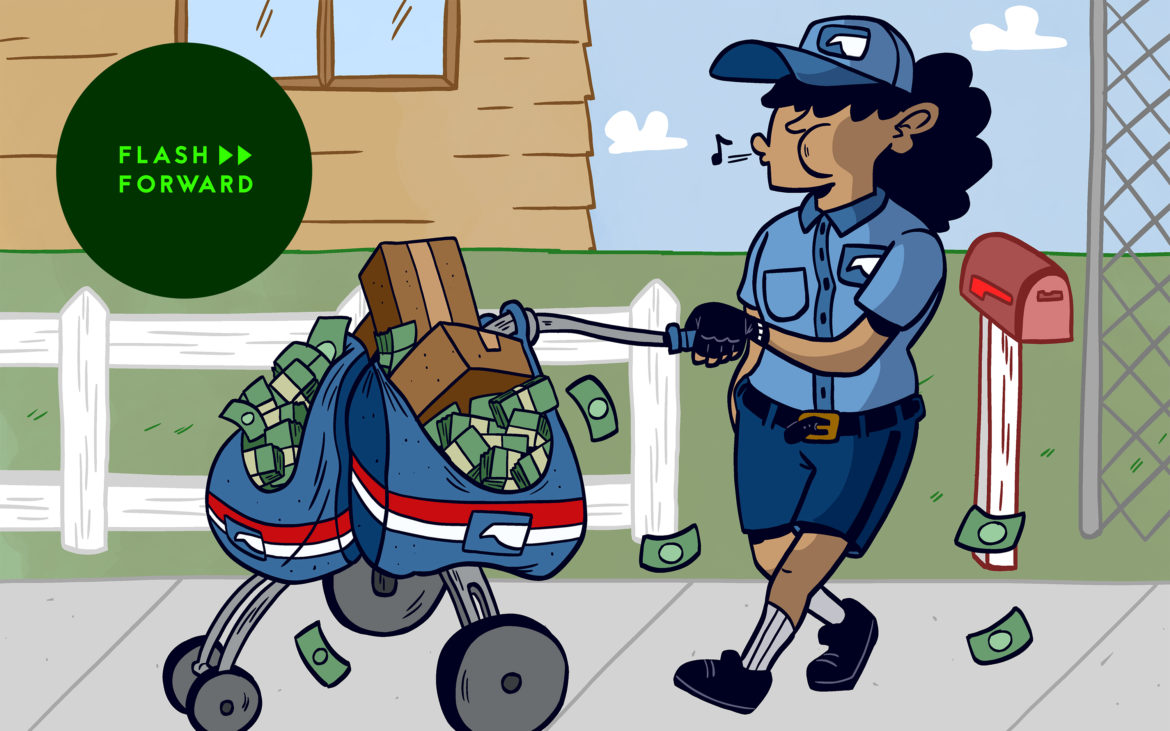
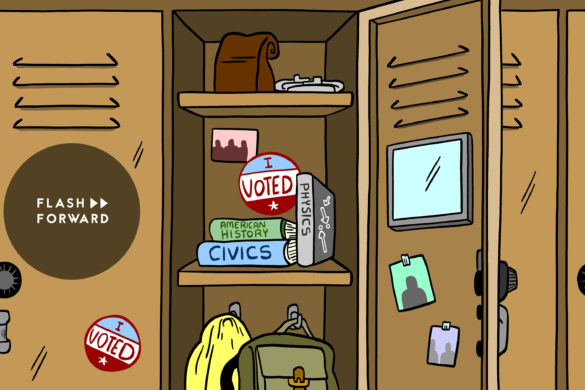
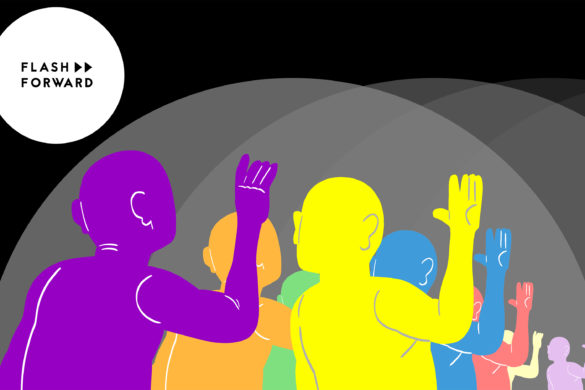
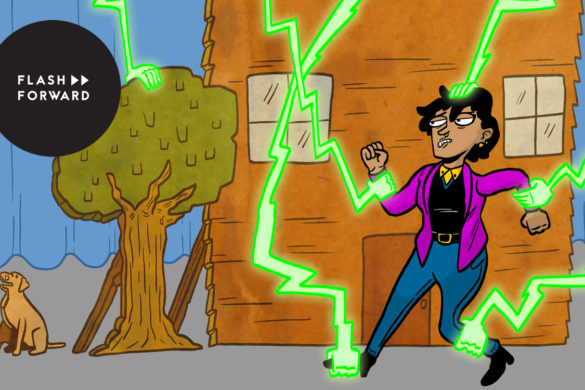
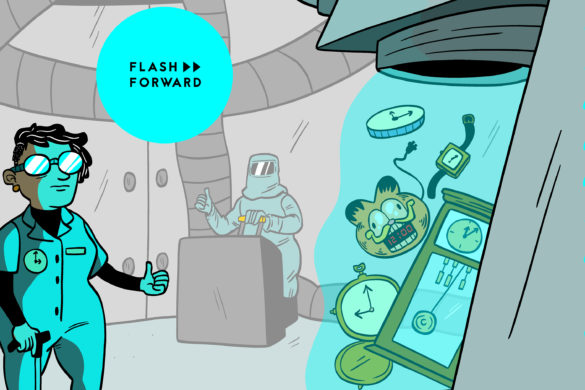
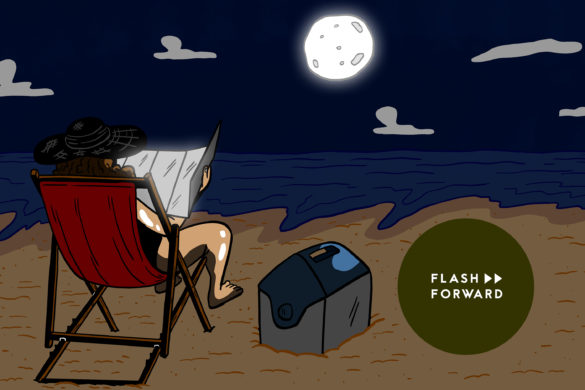
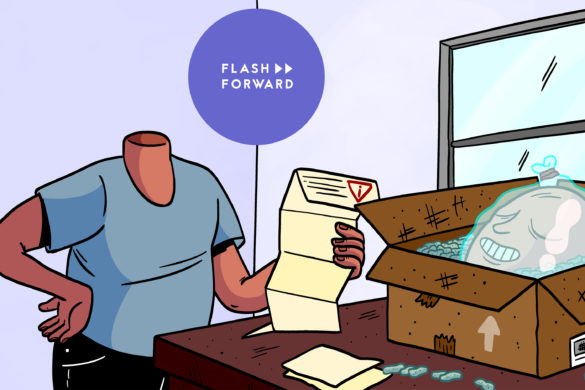
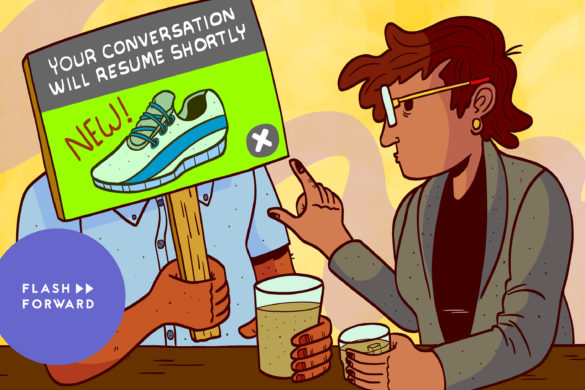
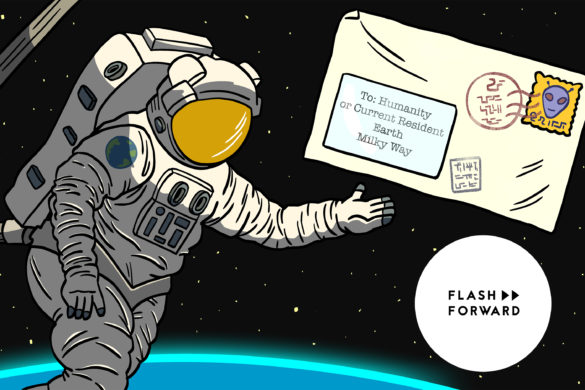
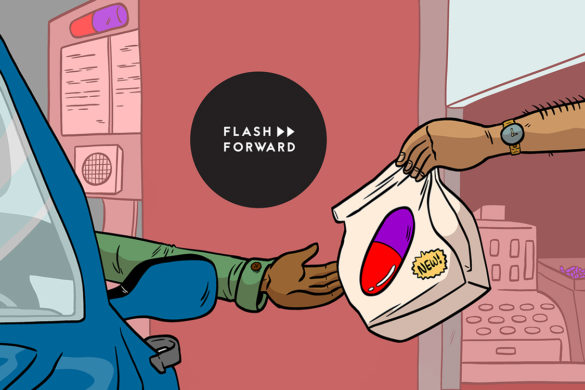
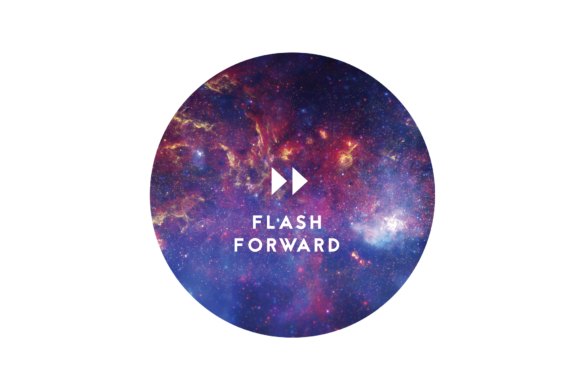
9 comments
“Libertarians love UBI.”
Correction: a very small percentage of libertarians think UBI is a good idea. No matter what group you refer to when you say “libertarians” (LP party members, anarcho-libertarians, voluntaryists, or “small-l” libertarians), the majority of them dislike and disagree with the idea of UBI because a) it does not decrease government power and b) the money has to come from somewhere, and most likely would pose significantly more tax burden for businesses.
Interesting! Maybe it’s sampling bias, but all the libertarians I know are into the idea, and I’ve read a lot of blog posts from self-identified libertarians about how it would be great. Of course, I should always be careful about speaking for everybody. I’m sure there are folks in all the groups I mentioned that don’t like UBI (tech moguls, leftists, etc). Thanks for the feedback!
They do exist, but they are definitely in the minority, at least in the US.
Anyway, thanks for producing a great podcast. Perhaps you could do an episode on a future where a region or group forms a stateless society. Lots of libertarians would love to help you with that one!
Starr, I’m a nine time award winning Singer-Songwriter in Fort Worth, TX. I just had a co-write titled “All About the Money” cut-recorded by Tennessee Larue, former Buck Owens Buckaroo. Very BIG back in the day. But to the point, this song is about how the Government handles our money-tax dollars, and what a gamble all they do ends up to be #?*! This letter is to ask if you use any tracts in your shows. Or if you can use a piece such as this. I can send you an MP3 to review if it may fill any of your media options. All work Copyright/BMI And, this song is some kind of work, and it could do your group and myself a world of good. If there is any interest, please respond. Thank you very much, Randy Steppick randysteppickmusic.com 817-901-3256
I am conducting an informal survey of libertarians on Facebook on the subject of UBI.
Answers are coming in: https://m.facebook.com/story.php?story_fbid=10215033455663247&id=1635773608&comment_id=10215033494384215¬if_t=feed_comment¬if_id=1537900101909814&ref=m_notif
[…] Money For Nothing […]
[…] Pick: Flash ForwardEpisodes: Money for NothingFitness in a […]
[…] Money For Nothing ~~ original Flash Forward episode […]
[…] FLASH FORWARD: Money For Nothing (Universal Basic Income) […]